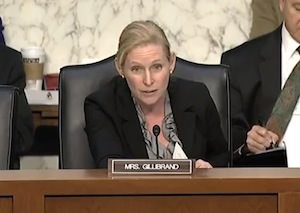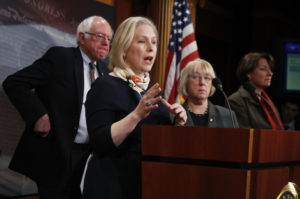Sen. Gillibrand Rips Military Over Handling of Sexual Assault Cases
On Wednesday, a Senate Armed Services subcommittee held a hearing to discuss rape and sexual assault in the military, the first one in nearly a decade. During the hearing, military lawyers answered questions about how the armed services handle such cases. But their answers left Sen. Kirsten Gillibrand "extremely disturbed."
The Pentagon estimates that there were 19,000 cases of sexual abuse in the military in 2010 alone. Of those, only a few hundred went to trial. The vast majority of those cases never get reported out of fear. Clearly, there is a problem with the system.
On Wednesday, a Senate Armed Services subcommittee held a hearing to discuss rape and sexual assault in the military, the first one in nearly a decade. During the hearing, military lawyers answered questions about how the armed services handle such cases.
But their answers left the hearing’s chair, Sen. Kirsten Gillibrand, D-N.Y., “extremely disturbed.”
“I don’t know how you can say that having 19,000 sexual assaults and rapes each year is discipline and order,” she said. “I do not understand how you can say, that of those 19,000, to only have approximately 2,400 even reported, because the victims tells us that they are afraid to report because of retaliation, and the blame they will get and the scorn they will get from their colleagues, is order and discipline. And I really cannot understand how of 2,400 cases, only 240 of which go to trial, can result in you believing that that authority is giving you discipline.”
The issue was brought to the forefront in part because of a high-profile case out of Aviano Air Base in Italy in which Lt. Gen. Craig Franklin, the commander of the 3rd Air Force, overturned the sexual assault conviction of Lt. Col. James Wilkerson, an F-16 pilot who was rated by superiors as “the best of the best.” Under military law, Franklin had the power himself to make the decision.
The case has garnered a lot of attention in the media, and Defense Secretary Chuck Hagel recently ordered a review of it.
The Guardian:
The case has fuelled concerns that the military does not do enough to protect members from sexual assault or act forcefully enough to prosecute offenders.
In a passionate exchange with the senior officers, during which Gillibrand cited 19,000 sexual assaults a year, with only 2,400 people coming forward because of fear, she questioned what constituted “good order and discipline”. She told the Jags their actions to improve the military sexual abuse crisis was “not enough”
Gillibrand asked Harding which he believed had done their duty in the Aviano case – the jury or the convening authority. When he said both, she said: “Well one of the parties was wrong”. Citing the testimony of the victim in the case, she said: “I can assure you she does not believe justice was done.”
— Posted by Tracy Bloom.
Your support matters…Independent journalism is under threat and overshadowed by heavily funded mainstream media.
You can help level the playing field. Become a member.
Your tax-deductible contribution keeps us digging beneath the headlines to give you thought-provoking, investigative reporting and analysis that unearths what's really happening- without compromise.
Give today to support our courageous, independent journalists.






You need to be a supporter to comment.
There are currently no responses to this article.
Be the first to respond.